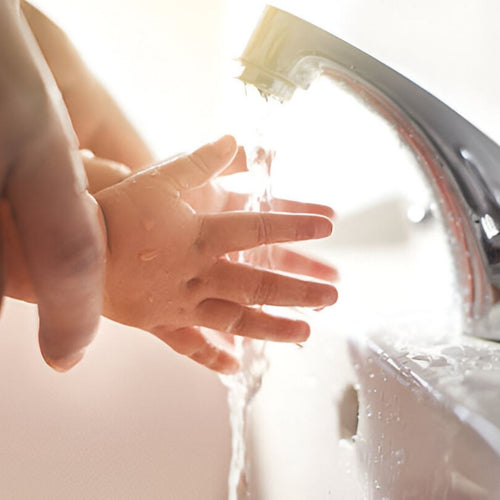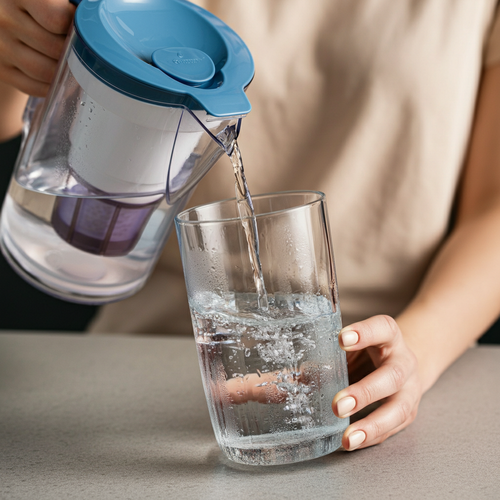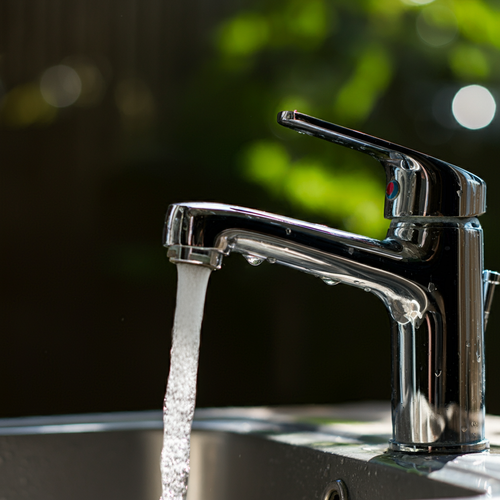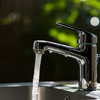Tannins in water can cause aesthetic and potential plumbing problems, but filtration systems effectively remove them. These systems utilize activated carbon or anion exchange resin to target and eliminate tannins, improving water quality. Understanding tannins, their effects, and the available solutions allows informed decisions about water treatment in your home. At SoftPro Water Systems, we specialize in providing high-efficiency water treatment solutions for homeowners across the United States. We aim to deliver the best water quality possible, addressing concerns like tannins to ensure clean, healthy water for every household.
What Are Tannins in Water?
Tannins are naturally occurring organic compounds found in various plant materials. They are complex polyphenols that leach into water sources, particularly groundwater and surface water in areas with decaying vegetation or peat bogs. Think of them like the compounds that give tea its brown color and slightly bitter taste.
Tannins themselves do not pose a significant health risk. However, they can cause several undesirable effects in your water:
- Brown or Yellowish Color: Tannins stain water, giving it an unpleasant hue, sometimes described as "tea-colored" or "yellow water."
- Bitter Taste: They impart a bitter, astringent flavor to the water, often likened to over-steeped tea.
- Odor: In some cases, tannins can contribute to an earthy or musty odor in the water.
- Plumbing Issues: Over time, tannins can build up in pipes and fixtures, potentially causing staining and clogging, particularly in older homes with iron pipes.
Tannins are distinct from other water contaminants like iron or manganese, which can cause similar discoloration but require different treatment methods. While iron typically causes reddish-brown stains and manganese leads to black or dark-brown deposits, tannins are characterized by their yellowish-brown hue and bitter taste. However, tannins often co-occur with iron and manganese, especially in well water, requiring a comprehensive treatment approach.

How to Identify Tannins in Your Water
Identifying tannins often involves a combination of observation and testing:
- Visual Inspection: Check for a brown or yellow tint in your water, especially after it has been sitting for a while. You might notice this discoloration more prominently in white sinks or bathtubs.
- Taste Test: Does your water have a bitter or astringent taste, similar to strong tea? This is a common indicator of tannins.
- Professional Water Testing: The most accurate way to identify tannins is through a professional water test. Many laboratories, including those certified by the Water Quality Association (WQA), and home test kits can detect tannin levels in your water, often measured in parts per million (ppm).
Effective Methods to Remove Tannins from Water
Several effective methods exist for removing tannins from your water supply:
Water Filters
Water filters are a common and effective solution for tannin removal. They work by using specific media to trap and remove tannins from the water as it passes through the filter.
-
Types of Filters:
- Activated Carbon Filters: These filters use activated carbon, a highly porous material with a large surface area, to adsorb tannins and other organic compounds. Activated carbon is particularly effective at removing the color and odor associated with tannins. It is also effective in removing chlorine, chloramine, and pesticides, which often co-occur with tannins in municipal water supplies.
- Anion Exchange Resin Filters: These filters use a special resin that exchanges negatively charged ions, like those found in tannins, for harmless chloride ions. Anion exchange resins are highly efficient at removing tannins and can also reduce the levels of other contaminants like sulfates and nitrates. They are particularly useful for treating well water with high total dissolved solids (TDS).
-
Whole-House vs. Point-of-Use Filters:
- Whole-house filters are installed on the main water line entering your home and treat all the water coming into the house. This provides comprehensive tannin removal for all your water needs, including showering, laundry, and appliances.
- Point-of-use filters are installed at specific locations, such as the kitchen sink or bathroom faucet, and treat only the water flowing through that fixture. These are ideal for targeting tannins in drinking water and are often more affordable than whole-house systems.
-
Installation and Maintenance: Proper installation and regular maintenance are essential for optimal filter performance. This includes replacing filter cartridges at recommended intervals, typically every 3 to 12 months, depending on the filter type, water usage, and tannin levels.
-
Specific Product Examples:
- For city water, the SoftPro ECO™ City Water Softener (upgraded Fleck 5600SXT) and the SoftPro® Elite HE Water Softener [CITY WATER] are excellent choices. These softeners effectively remove minerals that contribute to water hardness, which often accompanies tannins in municipal water.
- If you have well water, consider the SoftPro Smart Home+ Water Softener with DROP Technology [WELL & CITY WATER], the SoftPro ECO™ Well Water Softener (upgraded Fleck 5600SXT), or the SoftPro® Elite HE Water Softener [WELL WATER]. These systems are designed to handle the specific challenges of well water, including high levels of tannins, iron, and sediment.
- For comprehensive tannin removal and water softening, the SoftPro® Smart Home+ Water Softener & Carbon Filter is a top-of-the-line solution. This system combines the benefits of both technologies to deliver high-quality water throughout your home.
Water Softeners
While primarily designed to remove minerals that cause hard water, water softeners can also help reduce tannin levels. They utilize ion exchange to replace calcium and magnesium ions with sodium ions. This process can also remove some of the negatively charged tannins, although it might not be as effective as dedicated tannin filters.
-
How They Work: Water softeners use a resin bed containing small beads coated with sodium ions. As hard water passes through the resin, the calcium and magnesium ions are attracted to the beads and exchanged for sodium ions. This softens the water and can remove some tannins in the process.
-
Benefits Beyond Tannin Reduction: Water softeners offer numerous benefits beyond tannin removal, including:
- Preventing scale buildup in pipes and appliances, extending their lifespan and improving efficiency.
- Improving the effectiveness of soap and detergents, reducing the amount needed and saving money.
- Making hair and skin feel softer and reducing dryness caused by hard water.
-
SoftPro's Smart Home+ Water Softener: Our SoftPro Smart Home+ Water Softener with DROP Technology [WELL & CITY WATER] is an innovative solution that combines high-efficiency water softening with advanced technology. It uses DROP technology for remote monitoring and control, allowing you to track water usage, salt levels, and system performance from your smartphone or computer.
Other Methods
-
Aeration: Aeration involves exposing the water to air, which can oxidize tannins and make them easier to filter out. This method is often used in conjunction with other filtration techniques, such as activated carbon filtration or iron filtration. Aeration systems can be installed at the wellhead or within the home and are particularly effective for treating hydrogen sulfide (rotten egg odor) along with tannins.
-
Chlorination: Chlorine can effectively remove tannins, but it can also create harmful disinfection byproducts. It's essential to use chlorine carefully and ensure proper filtration to remove any residual chlorine. Chlorination is typically used in municipal water treatment plants and is less common for residential tannin removal due to its potential health concerns.
-
DIY Solutions: Some DIY methods can help reduce tannins, such as boiling water or using activated carbon in a pitcher filter. However, these methods may not be as effective as dedicated water filters or softeners. Boiling water can remove some tannins, but it's not a practical solution for large volumes of water. Using activated carbon in a pitcher filter can improve the taste and odor of water, but it may not remove all the tannins.

Choosing the Right Tannin Removal Solution
Selecting the best tannin removal solution depends on several factors:
-
Water Chemistry: A professional water test will identify the specific contaminants in your water, including tannin levels, and help determine the most appropriate treatment method. It's important to consider other factors like pH, iron content, and hardness when choosing a system.
-
Budget: Water treatment solutions range in price from simple filter pitchers to whole-house systems. Consider your budget and long-term costs, including filter replacements and maintenance.
-
Household Needs: Think about your water usage and the level of tannin removal required. If tannins primarily affect your drinking water, a point-of-use filter might suffice. However, if tannins are a problem throughout your home, a whole-house system is a better choice.
At SoftPro Water Systems, we offer a wide range of water treatment solutions to meet diverse needs and budgets. Our team of experts can help you select the most effective system for your specific water quality concerns.
Maintaining Your Water Treatment System
Proper maintenance is crucial for ensuring the long-term performance and effectiveness of your water treatment system.
-
Regular Filter Changes: Replace filter cartridges at the recommended intervals to prevent clogging and maintain optimal filtration. The frequency of filter changes will vary depending on the type of filter, water usage, and contaminant levels.
-
System Inspections: Periodically inspect your water treatment system for any signs of leaks, damage, or malfunction. This includes checking the pressure gauge, salt level (for water softeners), and overall system operation.
-
Manufacturer Guidelines: Always follow the manufacturer's instructions for maintenance and troubleshooting. This will help ensure the longevity and efficiency of your system.
Benefits of Tannin-Free Water
Removing tannins from your water provides numerous benefits:
-
Improved Taste and Odor: Enjoy fresh, clean-tasting water without the bitter astringency or musty odor caused by tannins. This can encourage increased water consumption and better hydration.
-
Reduced Staining: Prevent unsightly brown stains on your sinks, tubs, toilets, and laundry. This can save you time and money on cleaning products and protect your fixtures from discoloration.
-
Potential Health Benefits: While tannins themselves are not harmful, removing them can improve the overall quality and aesthetic appeal of your drinking water. This can lead to greater peace of mind and confidence in your water supply.
-
Protecting Plumbing Fixtures: Tannin buildup can damage plumbing fixtures over time. Removing tannins helps protect your investment and prevent costly repairs. This is particularly important for older homes with copper or galvanized pipes, which are more susceptible to tannin staining and corrosion.
Frequently Asked Questions (FAQs)
Are tannins harmful to my health?
Tannins are generally not considered harmful to human health at the levels typically found in drinking water. However, they can affect the taste, odor, and color of your water, and in high concentrations, they may contribute to plumbing issues. Some studies suggest that tannins may have antioxidant properties, but more research is needed to confirm these potential benefits.
How often should I change my tannin filter?
The frequency of filter changes depends on the type of filter, water usage, and tannin levels. Most manufacturers recommend replacing filter cartridges every 3 to 12 months. You can also monitor the color and taste of your water for signs that the filter needs replacement.
Can I remove tannins with a water softener?
Water softeners can help reduce tannin levels, but they are not as effective as dedicated tannin filters. For optimal tannin removal, consider a system that combines water softening with activated carbon or anion exchange filtration. This is especially important for well water, which often contains high levels of both tannins and minerals.
How much does it cost to remove tannins from water?
The cost varies depending on the chosen method. Simple filter pitchers can cost under \$50, while whole-house systems can range from a few hundred to several thousand dollars. The cost of professional installation and ongoing maintenance should also be considered.
How can I test my water for tannins?
You can test your water for tannins using a home test kit or by sending a water sample to a professional laboratory. Home test kits are readily available at most hardware stores and provide a quick and easy way to check for tannins. For more comprehensive testing, including analysis of other contaminants, a professional laboratory test is recommended.
What are some eco-friendly tannin removal solutions?
Eco-friendly tannin removal solutions include using sustainable filter media, such as coconut shell activated carbon, and choosing water treatment systems with low energy consumption. Regularly cleaning and maintaining your system can also extend its lifespan and reduce waste.
How do tannins affect my hair and skin?
Tannins can contribute to dry hair and skin, similar to the effects of hard water. They can also cause discoloration and buildup on hair, making it feel rough and difficult to manage. Removing tannins can improve the health and appearance of your hair and skin.
Can tannins damage my appliances?
Tannins can contribute to staining and buildup in appliances, particularly those that use hot water, such as dishwashers and washing machines. This can reduce their efficiency and lifespan. Removing tannins can help protect your appliances and prevent costly repairs.
Are there specific tannin removal solutions for different water sources?
Yes, different water sources may require specific tannin removal solutions. Well water often contains higher levels of tannins and other contaminants, such as iron and sediment, requiring a more comprehensive treatment approach. City water may contain chlorine and chloramine, which can be removed with activated carbon filters.
Can I install a tannin filter myself?
While some point-of-use filters are easy to install, whole-house systems often require professional installation. It's important to follow the manufacturer's instructions and consult with a qualified plumber if you have any questions or concerns.
How can I tell if my tannin filter is working properly?
You can monitor the color, taste, and odor of your water to assess the effectiveness of your tannin filter. If you notice any changes, such as a return of the brown tint or bitter taste, it may be time to replace the filter cartridge.
Are there any government regulations on tannins in drinking water?
The Environmental Protection Agency (EPA) does not currently have a specific maximum contaminant level (MCL) for tannins in drinking water. However, they are considered a secondary contaminant that can affect the aesthetic quality of water. Some states or local municipalities may have their own guidelines or regulations regarding tannins in water.

Achieving Optimal Water Quality: Tannin Removal and Beyond
Effectively addressing tannins in water requires a multifaceted approach. We identify these organic compounds through visual cues like discoloration, taste tests revealing bitterness, and precise measurements with professional testing. Various solutions exist, including filtration with media like activated carbon and anion exchange resins, as well as water softening to address co-occurring mineral content. Choosing the right method depends on factors such as water chemistry, budget, and household needs.
Diligent maintenance, including regular filter changes and system inspections, ensures long-term performance. The benefits of tannin-free water extend beyond aesthetics, encompassing improved taste, protection of plumbing infrastructure, and potential health advantages.
SoftPro Water Systems offers a diverse range of solutions tailored to individual requirements. Our commitment to customer satisfaction and sustainable practices underscores our dedication to providing clean, healthy water for every home.
Contact us today on our Contact Us Page for a free water analysis and personalized consultation. Our team of experts will guide you through the process of selecting and maintaining the ideal water treatment system for your specific needs.


















![Aldex Premium 10% Cross Link Resin for Water Softener [High Capacity]-SoftPro® Water Systems](http://www.softprowatersystems.com/cdn/shop/files/Aldex_10_Cross_Link_Resin_Premium_High_Capacity_for_Water_Softener_600x.jpg?v=1735853599)
















